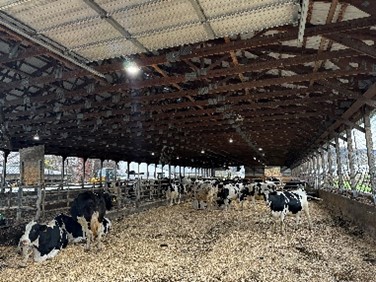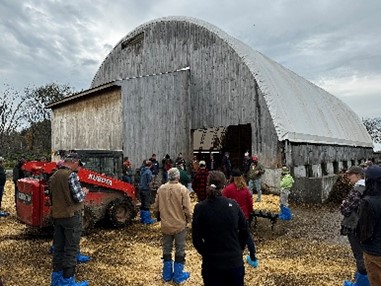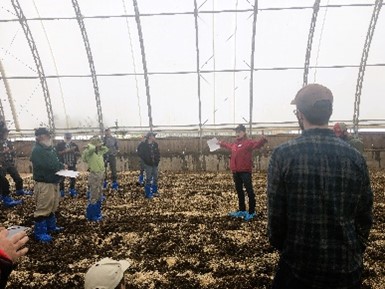Register Now for the Northeast Dairy Innovation Summit
By Katie Spring, Northeast Dairy Business Innovation Center
Registration is open for the Northeast Dairy Innovation Summit! Join the Northeast Dairy Innovation Center (NE-DBIC), along with dairy farmers, processors, service providers, and industry stakeholders on April 2 - 3 in Albany, NY.
The Summit will include tracks on dairy farm innovation, processing innovation and expansion, and workforce development. We’ll dig into topics including expanding diversity and equity in the dairy workforce; how smaller dairies can benefit from innovative technology; how to grow sales through marketing and branding; market opportunities for goat and sheep dairy; shifting to climate-smart practices; building resiliency in dairy processing; and more.
Join the conversation as we envision the next steps toward a resilient regional dairy sector! Dairy Farmers and Processors will receive discounted rates. Learn more and register online at nedairyinnovation.com/summit
The Year Ahead: Funding for Dairy Innovation in 2023
By Ali Boochever, Northeast Dairy Business Innovation Center at VAAFM
At NE-DBIC, our goal is to help dairy farms and processors innovate to become more sustainable and resilient. Whether you’re looking for funding to purchase specialized equipment, to implement an innovative practice, or to receive technical assistance, consider applying for an NE-DBIC grant this year.
Open Funding Opportunities:
On-Farm Milk Storage & Handling Grant
This grant provides funds for dairy farmers to enhance milk storage, handling, and energy efficiencies. Funds can be used to purchase bulk tanks, milk pipelines, glycol chillers, milk loading systems, reclaim systems for water, cooling equipment, plate coolers/heat exchangers, and cover equipment installation costs. Read the RFA for more information about eligible costs and activities.
The application period will be open until January 18, 2024. Awards will range from $15,000 to $50,000 with a 25% cash or in-kind match requirement. Total funds available in this round: $800,000.
Dairy Food Safety & Certification Grant
This funding opportunity will provide grants for dairy farmers, processors, and/or producer associations to take actionable steps to improve the safety of dairy products. Projects funded through this program will support increased production safety standards with the goal of accessing new markets. Food safety activities under this grant should build upon baseline state and federal compliance requirements to further improve product consistency, safety, and quality of dairy products.
The application period for this grant program is January 4-February 22, 2024, at 2:00 PM ET. Awards will range from $10,000 to $50,000 with a 25% cash or in-kind match requirement. Total funds available in this round are expected to be about $600,000.
Upcoming Funding Opportunities:
Goat & Sheep Dairy Supply Chain Development Grant
This grant program will provide funds to support individual small ruminant dairy businesses and/or supply chain projects that will develop or expand goat and/or sheep dairy products or markets. Look for the RFA to be released in February.
Awards will range from $15,000 to $50,000 with a 25% match commitment. Approximately $760,000 total funds available this round.
For more information about these grants, contact the NE-DBIC team at agr.dairyinnovation@vermont.gov
Find our full funding calendar on our website at nedairyinnovation.com/grants
Bedded Pack Workshops Highlight Best Management Practices
By Kelsie Meehan and Whitney Hull, UVM Extension
In October 2023, UVM Extension and Vermont NRCS co-hosted two on-farm bedded pack workshops with special guest speaker, Dr. Marcia Endres, professor of Animal Sciences at the University of Minnesota. The workshops were well-attended, with a total of 59 dairy and livestock farmers and service providers from Vermont, Massachusetts, and New York participating across the two days.
Dr. Endres, an expert in dairy cattle production and well-being, shared the findings of her extensive research on bedded pack barns for dairy production, discussing considerations specific to cold climates such as Vermont. She highlighted good management as the key to success with bedded pack structures, such as tilling and using enough bedding material to regulate pack moisture, providing adequate ventilation, and keeping overstocking to a minimum. When these best management practices are applied, bedded pack barns can enhance cow comfort, reduce lameness, encourage expression of natural behaviors, and offer potential labor savings.
Dr. Endres emphasized that maintaining clean and dry bedding is essential to avoid the potential for increased risk of mastitis in a bedded pack structure. She explained that sourcing adequate bedding has been a limiting factor for the expansion of bedded pack barns in Minnesota, where, like in Vermont, bedding materials such as wood shavings have become more expensive and more challenging to source.
Bob Thompson of NRCS discussed examples of bedded pack barns in Vermont, management considerations, and the financial support programs available from NRCS.
The two host farms highlighted different management styles of bedded pack barns. Tyler and Melanie Webb of Stony Pond Farm in Fairfield gave a tour of their active composting bedded facilities, which house their milkers and dry cows during the winter months when they are not on pasture. The Webbs manage their bedded packs by tilling twice daily and applying wood shavings weekly and as needed.
Rich and Mandy Hulett of Deer Flats Farm in Pawlet gave a tour of their deep bedded pack barns that house their weaned heifers and dry cows and serve as their calving facility. The Huletts bed their pack three times per week with wood chips and remove all pack material to be stacked for composting every 8-10 weeks as needed.
Farmer-to-farmer connections were a highlight of the workshops, with producers discussing their management practices and barn design considerations. Additionally, all participants received a certificate of training completion from NRCS, making them eligible to apply for financial assistance for bedded pack structures through NRCS EQIP.
These workshops were sponsored by the Northeast Dairy Business Innovation Center and organized by Kelsie Meehan and Whitney Hull of UVM Extension’s Dairy Herd Management Technical Assistance Program, which offers support to dairy farms statewide. To work with our team, please contact us via our online request form, or call or email us directly: Kelsie Meehan: kelsie.meehan@uvm.edu (802) 656-4829 Whitney Hull: whitney.hull@uvm.edu (802) 656-7563



Images: Bedded Pack – Deer Flats photo by Whitney Hull Bedded pack at Stony Pond Farm photos by Whitney Hull (center) and Kelsie Meehan (right)

